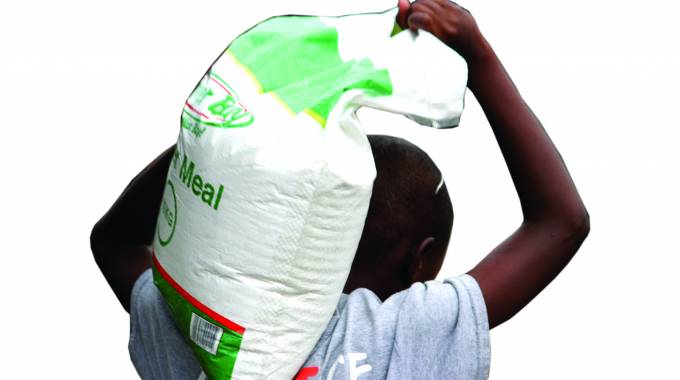
The Sunday Mail

Society Reporter
LOCAL millers are now prioritising production of refined mealie-meal in a bid to dodge Governments’ roller-meal subsidy programme, The Sunday Mail Society has established.
This is despite the fact that Government continues to supply millers with maize to guarantee success of the subsidy scheme.
Refined mealie-meal, which had vanished from shelves, is now readily available in most shops, but it is selling at premium prices.
However, the scramble for subsidised roller meal continues.
A 10kg bag of refined mealie-meal is being sold for about $229, with a 5kg bag fetching between $119 and $120.
It is believed that retailers are pushing for a 10kg bag of roller meal to be reviewed to $120, which is $50 higher than the gazetted price.
Last week, most shops in the capital were well-stocked with various refined mealie-meal brands.
Grain Millers’ Association of Zimbabwe (GMAZ) spokesperson Mr Garikai Chaunza said he could only comment on the developments after ongoing multi-stakeholder meetings.
“I will only give you a detailed report once we finalise meetings with some of our stakeholders. Some of the meetings are taking place end of this week (last week). It is only then that I will be in a position to give you a current and detailed update,” said Mr Chaunza.
Most shop supervisors who talked to The Sunday Mail Society confirmed that delivery of refined mealie-meal had improved vastly.
A miller, who spoke to this publication off the record for fear of victimisation, said challenges surrounding the mealie-meal subsidy programme “are taking too long to be addressed”.
“Currently, small millers are owed more than $20 million. Although the Ministry of Finance (and Economic Development) claims that it is making payments into millers’ accounts, the money is simply not reflecting,” said the miller.
“There seems to be lack of (urgency) in Government departments, which is seemingly affecting the effective coordination of the programme.”
It is believed that some players in the sector are now resorting to either importing their own maize or buying it from middlemen in order to “circumvent the bureaucracy”.
Small-to-Medium Millers’ Association of Zimbabwe (SMMAZ) interim chairperson Mr Davis Muhambi said the organisation had been assured of payments by Treasury.
“The last figure we heard (of money owed to small millers) was about $140 million in total. So far, we have verified about $20 million from just 10 of our members, in the last week alone, which we are rigorously pursuing with the Ministry of Finance. The programme is open to all SME millers who would want SMMAZ’s support.”
Mr Muhambi emphasised the need for periodic consultative and review meetings between Government, millers and retailers, “starting with one immediately”.
“This should resolve any challenges and give better clarity on the programme. In that regard, we have written to all ministries requesting for such a consultative roundtable,” he added.
Attempts to get a comment from the Ministry of Finance and Economic Development were fruitless by the time of going to print.
However, Industry and Commerce Minister Dr Sekai Nzenza told The Sunday Mail Society the relatively cheaper roller meal was disappearing from shops because of hoarding.
“The (roller meal) taskforce led by Mrs Zhanje from Ministry of Industry and Commerce is coordinating and monitoring the process of delivering roller meal on the shelves. However, once the 10kg bag gets on the shelves, we are faced with the challenge of hoarding,” she said.
Reprieve
Players in the maize-meal supply chain believe the some consumers will get a reprieve when maize harvesting begins in a month’s time. Mr Paul Zakariya, the executive director of the Zimbabwe Farmers’ Union (ZFU), said the projected harvests will help ease demand for maize meal, particularly in supermarkets.
“This is clearly a supply versus demand issue. Harvesting may begin, but as long as we have a maize deficit, I do not see the prices of maize-meal going down,” he said.
Programmes such as “Pfumvudza”, he adds, have to be prioritised to curb the mealie-meal shortages.
“Communal farmers must produce maize that covers the needs of their families. That is what the farmers used to do. ‘Pfumvudza’ is the solution to household food insecurity,” Mr Zakariya said.
Pfumvudza is an innovation that makes it possible for each household to produce its own food, with the excess being sold.
Due diligence
Mr Denford Mutashu, president of the Confederation of Zimbabwe Retailers, said the supply of mealie-meal has been constrained in the past two weeks.
He said imported maize-meal, especially from South Africa, is not only expensive, but it is going unchecked by health officials as well.
“The market has been flooded by South African brands. We are not sure whether proper checks and balances were done before the products hit our shelves.
“We are not certain if the maize-meal from South Africa is certified and, therefore, fit for human consumption. Consumers are buying out of desperation, but that is putting their lives at risk,” he said.
Mr Mutashu said there was need for Government to further boost maize deliveries to millers through the Grain Marketing Board (GMB).
“I enquired with the millers last week and they are saying they are left with insignificant maize stocks,” he said.
CZR believes Government needs to consider adding rice to its subsidy programme.
“The price of rice is not favourable. Since we are facing maize-meal shortages, it would be prudent for the introduction of mechanisms that will result in rice being a cheaper alternative to maize meal,” he said.
Early this year, Government set up a mealie-meal taskforce, whose mandate is to ensure transparent and equitable distribution of the product.
The taskforce is made up of officials from the Ministry of Industry and Commerce, CZR and the GMB, among others.
It has since unearthed serious irregularities throughout the entire supply chain.
Zimbabwe’s annual maize consumption presently stands at 1,8 million tonnes.



